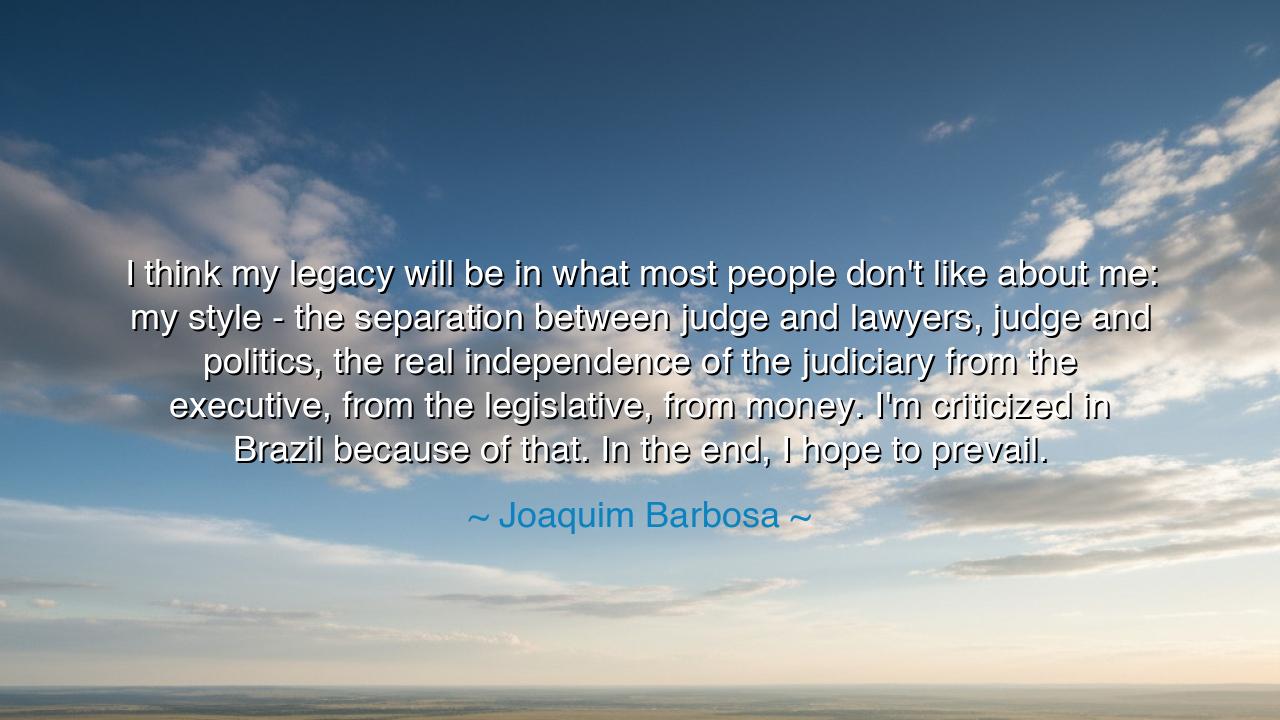
I think my legacy will be in what most people don't like about
I think my legacy will be in what most people don't like about me: my style - the separation between judge and lawyers, judge and politics, the real independence of the judiciary from the executive, from the legislative, from money. I'm criticized in Brazil because of that. In the end, I hope to prevail.






The words of Joaquim Barbosa, when he declared, “I think my legacy will be in what most people don’t like about me: my style — the separation between judge and lawyers, judge and politics, the real independence of the judiciary from the executive, from the legislative, from money. I’m criticized in Brazil because of that. In the end, I hope to prevail,” rise like a solemn vow spoken by a guardian of justice. In these words burns the spirit of a man who stood at the crossroads of principle and popularity, choosing the harder path — the path of independence, of incorruptible integrity, of loyalty not to power but to truth. Barbosa, the first Black Chief Justice of Brazil’s Supreme Federal Court, speaks here not of pride, but of purpose — of a life spent defending the sacred wall that must forever stand between justice and influence.
To understand his words, one must know the weight of his journey. Born in poverty in the heart of Brazil, Joaquim Barbosa rose through determination and study to stand among the nation’s highest judges. He carried with him not the privilege of birth, but the discipline of character — a man shaped not by comfort, but by conviction. When he ascended to the Supreme Court, he became not only a symbol of progress but a living test of courage. For in a land where politics and power often entwined, he dared to draw a line — declaring that the judiciary must remain free, untouched by money, unbent by influence, unmoved by fear.
In his “style”, as he called it, lay both his strength and his solitude. Barbosa insisted upon separation — between judge and lawyer, between judge and politics, between justice and corruption. He believed that to judge rightly, one must stand apart — like a mountain above the valley, close enough to see the world, yet far enough to remain untouched by its storms. His demeanor was sometimes called cold, even arrogant, but beneath that iron surface lay the fire of integrity. He understood that justice cannot bow to charm, nor bend to convenience. In choosing independence, he accepted isolation — for the servant of truth must often walk alone.
His stand came to its fiercest test during the Mensalão corruption scandal, one of the most significant trials in Brazilian history. Powerful politicians, lawmakers, and business figures stood accused of buying votes within the government — an act that struck at the heart of democracy itself. Barbosa presided over the case with unwavering resolve. While others hesitated, he pressed forward, exposing the rot that lay beneath the nation’s political fabric. He did not spare the mighty, nor flatter the influential. In those days, he became both hero and target — revered by those who longed for justice, reviled by those who feared it. His independence was his shield, and though it earned him enemies, it also immortalized his courage.
When Barbosa speaks of being criticized, he reveals the eternal truth that integrity is rarely comfortable, and righteousness is rarely popular. The ancients knew this well. Socrates, who chose death rather than betray his conscience, and Cicero, who spoke against tyranny and paid with his life, both stood as pillars of integrity against the corruption of their times. Like them, Barbosa understood that the role of the judge — and indeed, of any just person — is not to please the powerful, but to defend the principles that keep civilization from decay. His words, “In the end, I hope to prevail,” are not the boast of a man seeking victory over others, but the prayer of one who seeks victory for truth itself.
The meaning of Barbosa’s quote extends beyond the halls of the Brazilian court. It speaks to every age and every society where justice risks being bought, where truth bends to wealth, and where conscience bows to convenience. He teaches that independence is not merely a political principle, but a moral one — the foundation upon which all virtue rests. For the man or woman who cannot stand apart from influence, who cannot resist the pull of favor or fear, cannot serve truth. To be independent, in the truest sense, is to live guided by principle, even when that principle costs you ease, approval, or safety.
So, O listener, take this teaching into your heart. In your own life, let there be the same sacred separation that Barbosa defended — between your conscience and corruption, between your integrity and the seductions of compromise. Do not measure your worth by how you are liked, but by how faithfully you uphold what is right. Remember: to walk the path of independence is to walk through solitude, but it is also to walk toward light. As the judge must stand apart to see clearly, so too must you learn to stand firm when others waver.
Thus, the wisdom of Joaquim Barbosa endures: that the independence of the judiciary, and indeed of the human soul, is the final fortress of justice. His “style,” though scorned by some, was in truth a moral architecture — a shield for fairness, a barrier against tyranny. Let his words remind us that in the face of corruption, silence is betrayal, and compromise is defeat. To be independent is to be free, and to be free is to serve truth above all else. And though the righteous may stand alone for a time, in the end — as Barbosa himself said — they will prevail.






AAdministratorAdministrator
Welcome, honored guests. Please leave a comment, we will respond soon